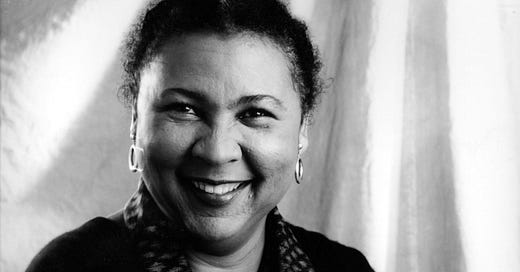Having you ever started highlighting a book and given up because you’re highlighting everything?
That’s me with bell hooks. As I did in my previous post, I’d like to share a few quotes from another one of the people I turn to when I need to remember why justice matters.
The first quote I remember noticing from bell hooks (a name she chose for herself in honor of her grandmother and kept lowercase to shift attention away from herself), is one that helped me understand why I stayed in school for so long:
I came to theory desperate, wanting to comprehend—to grasp what was happening around and within me. (Theory as Liberatory Practice, p. 59)
My desperations were not the same as hers—she grew up in an abusive family that dodged questions about racism and sexism—but whatever our particular hurts, we do well to remember that theory is not for theory itself. Theory is for grasping what’s happening in and around us, and doing something about it.
I love bell hooks because she’s honest and personal like that. She told her own stories. She spent a lot of time with children, and it shows in the playfulness and candor of her writing.
Hooks wrote mostly about feminism and anti-racism, but she always kept it real. Instead of writing theory about esoteric terms, she wrote a whole book on love, and another on hope. These are not your typical grad school topics, but she showed us they could be.
I also love bell hooks because she kept her eyes on the good, even with a full awareness of the bad. Here she explains why:
There have been many quiet moments of incredible shifts in thought and action that are radical and revolutionary. To honor and value these moments rightly we must name them even as we continue rigorous critique. Both exercises in recognition, naming the problem but also fully and deeply articulating what we do that works to address and resolve issues, are needed to generate anew and inspire a spirit of ongoing resistance. When we only name the problem, when we state complaint without a constructive focus on resolution, we take away hope. In this way critique can become merely an expression of profound cynicism, which then works to sustain dominator culture. (Teaching Community: A Pedagogy of Hope, p. xiii.)
Finally, I love bell hooks because she welcomes White people into the struggle against racism, and men into the struggle against sexism, and whoever you are into a struggle for a better society. She won’t let anybody off the hook easy, but nether will she disparage what you have to offer.
When black people/people of color fully embrace the reality that white people who choose to do so can be anti-racist to the core of their being, then we draw these folks to us. Their commitment to anti-racism does not mean they never make mistakes, that they never buy into race privilege, or that they never enact in daily life racial domination. This could always happen on an unconscious level. What it does mean is that when they make a mistake they are able to face it and make needed repair. (Teaching Community, p. 61)
She was a person of rugged hope. I think she’ll remind you of others who have patiently walked with you along the way to justice. I hope you’ll check out her writing.




